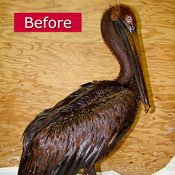April 20: British Petroleum offshore oil-drilling rig Deepwater Horizon explodes, and maintains combustion over the next day.
April 21: The U.S. Interior Secretary Ken Salazer coordinates the government's response. Some rig workers are reported missing, 11 presumed dead.
April 22: The above-surface rigging warps with the heat of its fire and collapses into the sea, dragging with it the well pipe, potentially rupturing it in several places. The Coast Guard does not acknowledge leaking oil.
April 24: BP reports a leak, but estimates the leak to only be 1,000 barrels a day.
April 29: Coast Guard offers new estimate, calculating the leak to be five times higher than BP initially reported. Louisiana Gov. Bobby Jindal declares a state of emergency.
April 30: Homeland Security Secretary Janet Napolitano calls the spill "of national significance."
May 2: President Barack Obama visits Venice, La., on his first spill-centered visit. The National Oceanic and Atmospheric Administration bans fishing in a large portion of the Gulf from the Mississippi River outlet to Pensacola, Fla.
May 3: BP claims full responsibility for liability issues.
May 7: BP lowers a specially constructed oil containment vessel over the main leak
May 8: BP reports that ice crystals prevent the May 7 "cap" from capping the leak.
May 11: BP executives, Transocean executives and Halliburton executives point fingers at one another before Congress for the explosion.
May 11: Interior Secretary Ken Salazar reveals plan to split the Minerals Management Service into different agencies.
May 13: Congressional investigators determine the rig's blowout preventer had a hydraulic leak and a failed battery.
May 17: BP reports that it is successfully siphoning off a percentage of the massive leak spewing underwater. Congress remains unimpressed.
May 18: NOAA doubles the portion of the Gulf now restricted to fishing. Scientist suspect the actual amount of oil escaping the well to be incalculable.
May 19: Oil enters Gulf "Loop Current," potentially expanding its presence to Florida and beyond.
May 21: Congress creates oil commission to investigate BP explosion. Oil reaches Louisiana wetlands.
May 23: U.S. threatens to push aside BP and commandeer well-capping effort
May 24: U.S. government orders BP to use less dispersant, claiming dispersant is too toxic.
May 25: BP attempts "top kill" plan, pumping mud and heavy liquids directly into well. Cuban government fears oil could foul Cuban waters.
May 28: BP announces "top kill" plan a failure.
May 30: White House energy adviser Carol Browner tells NBC "more oil is leaking into the Gul of Mexico than at any other time in our (nation's) history."
June 1: U.S. Attorney General Eric Holder announces that federal authorities have opened criminal and civil investigations into the spill.



Comments
Use the comment form below to begin a discussion about this content.